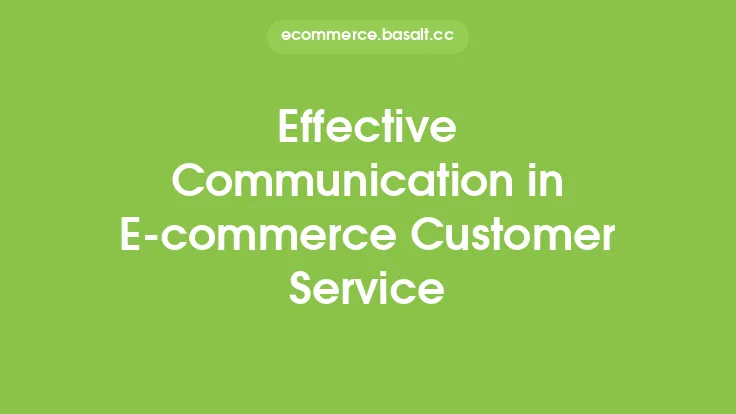In the realm of e-commerce, customer support plays a pivotal role in ensuring customer satisfaction, loyalty, and ultimately, the success of the business. Effective communication is the backbone of excellent customer support, as it enables support agents to resolve issues efficiently, address customer concerns, and provide a positive experience. In this article, we will delve into the essential communication strategies that e-commerce businesses can employ to deliver top-notch customer support.
Understanding Customer Needs and Preferences
To develop effective communication strategies, it is crucial to understand the needs and preferences of customers. This involves recognizing the various communication channels that customers use to interact with businesses, such as phone, email, live chat, social media, and messaging apps. E-commerce businesses should also be aware of the devices and platforms that customers use to access their websites and make purchases, including desktops, laptops, mobile devices, and tablets. By understanding customer needs and preferences, businesses can tailor their communication strategies to meet the unique requirements of their target audience.
Clear and Concise Communication
Clear and concise communication is essential for effective customer support. Support agents should be able to articulate complex information in a simple and easy-to-understand manner, avoiding technical jargon and ambiguous language. This involves using plain language, providing step-by-step instructions, and offering relevant examples to illustrate key points. Additionally, support agents should be mindful of their tone, ensuring that it is friendly, empathetic, and professional. By communicating clearly and concisely, support agents can resolve issues quickly, reduce customer frustration, and improve overall satisfaction.
Active Listening and Empathy
Active listening and empathy are critical components of effective communication in customer support. Support agents should be able to listen attentively to customer concerns, ask relevant questions to clarify issues, and acknowledge customer emotions. This involves maintaining a customer-centric approach, focusing on the customer's needs and concerns, and providing personalized support. By actively listening and showing empathy, support agents can build trust, establish rapport, and create a positive experience for customers.
Using Positive Language and Tone
The language and tone used by support agents can significantly impact the customer experience. Using positive language and tone can help to diffuse tension, reduce stress, and create a more pleasant interaction. This involves using phrases such as "I can help you with that" or "I'm happy to assist you," and avoiding negative language or tone that can come across as dismissive or unhelpful. Support agents should also be mindful of their body language, facial expressions, and vocal tone, as these nonverbal cues can convey empathy, enthusiasm, and a willingness to help.
Providing Timely and Relevant Responses
Timely and relevant responses are essential for effective customer support. Support agents should be able to respond promptly to customer inquiries, providing accurate and relevant information that addresses the customer's concerns. This involves using knowledge bases, FAQs, and other resources to provide quick and accurate answers, and escalating complex issues to senior support agents or subject matter experts when necessary. By providing timely and relevant responses, support agents can reduce customer wait times, improve resolution rates, and enhance overall customer satisfaction.
Leveraging Technology to Enhance Communication
Technology can play a significant role in enhancing communication in customer support. E-commerce businesses can leverage tools such as live chat, chatbots, and messaging apps to provide quick and convenient support, and use analytics and reporting tools to track customer interactions, identify trends, and optimize support processes. Additionally, businesses can use social media and other digital channels to engage with customers, provide proactive support, and build brand awareness. By leveraging technology, businesses can improve response times, increase efficiency, and provide a more personalized experience for customers.
Continuous Training and Improvement
Finally, continuous training and improvement are essential for delivering effective communication in customer support. E-commerce businesses should provide ongoing training and coaching to support agents, focusing on communication skills, product knowledge, and customer service best practices. This involves using role-playing exercises, scenario-based training, and feedback sessions to help support agents develop the skills and confidence they need to provide excellent support. By continuously training and improving support agents, businesses can ensure that customers receive a consistently high level of service, and that support agents are equipped to handle complex issues and provide personalized support.




